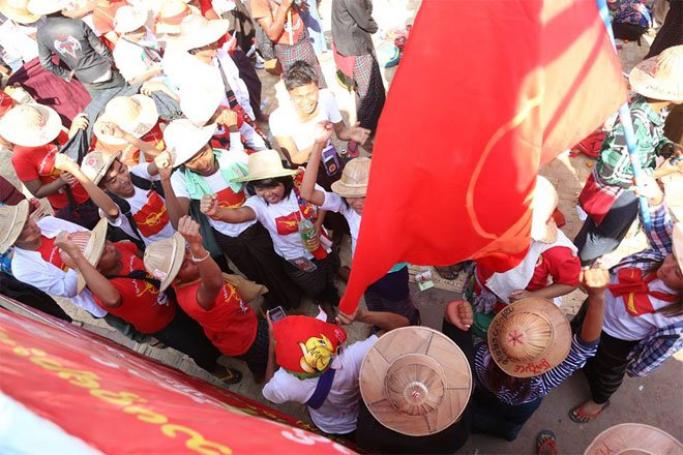Myanmar riot police March 4 corralled dozens of student protesters calling for education reform after activists defied official orders to disband and the tense deadlock entered a third day.
A core group rallied near a monastery compound in the central town of Letpadan despite being encircled by police who have vowed to prevent their planned march to the country's main city Yangon.
"The government is now blocking us from all sides," said student activist leader Ma Phyo Phyo Aung, adding that several protesters had fallen ill from sitting in the fierce tropical heat.
"I think they want to cut us off and stop other students from joining us," she told AFP, referring to around 50 other activists camped inside the monastery.
Some other students have entered the second day of a hunger strike in protest over the current education laws.
Tensions have risen since students March 3 ignored a deadline from the authorities to disperse and give up plans of marching to Yangon, some 130 kilometres further south and the scene of previous major student-led demonstrations.
Students have rallied for months against controversial education legislation, calling for changes to the new law including decentralising the school system, giving students the right to form unions and teaching in ethnic minority languages.
Authorities have appeared reluctant to crack down on the protests, which have been held without permission in a country where unauthorised rallies often lead to arrests.
Myanmar's parliament is instead rethinking the laws in discussions due to end next week.
Student activism is a potent political force in Myanmar with young campaigners at the forefront of several major uprisings, including a mass 1988 demonstration that prompted a bloody military assault under the former junta.
Myanmar's quasi-civilian government has undertaken a wide range of reforms since replacing military rule in 2011 and ending the country's decades of isolation.
But rights groups and opposition leader Daw Aung San Suu Kyi have raised concerns that reforms are stalling.
© AFP
You are viewing the old site.
Please update your bookmark to https://eng.mizzima.com.
Mizzima Weekly Magazine Issue...
14 December 2023
Spring Revolution Daily News f...
13 December 2023
New UK Burma sanctions welcome...
13 December 2023
Spring Revolution Daily News f...
12 December 2023
Spring Revolution Daily News f...
11 December 2023
Spring Revolution Daily News f...
08 December 2023
Spring Revolution Daily News f...
07 December 2023
Diaspora journalists increasin...
07 December 2023
Criticism about advance voting












